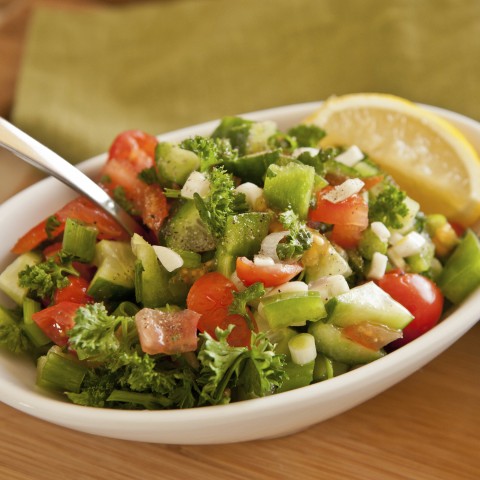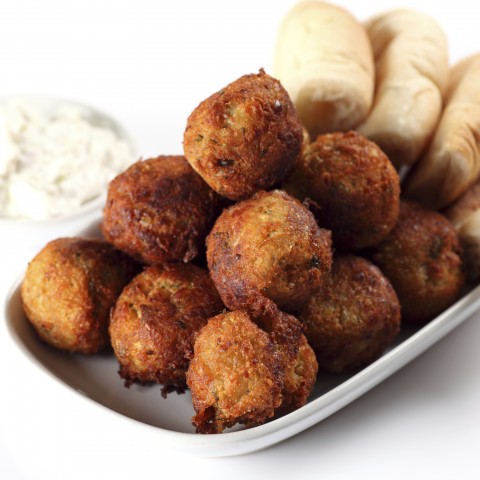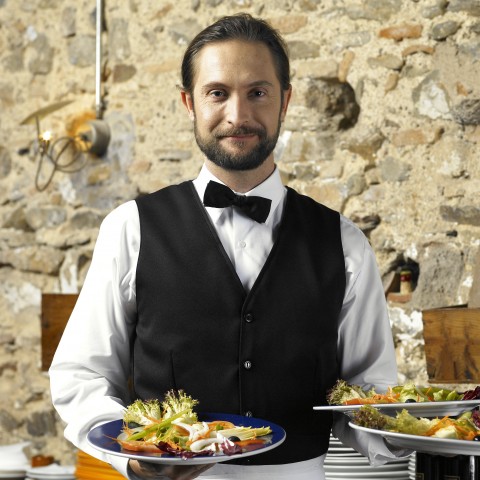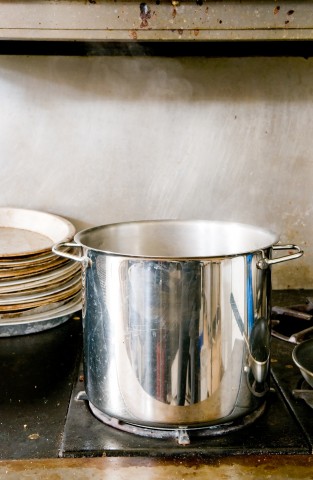
If you’ve ever been to a typical Israeli restaurant (i.e., not one run by Yotam Ottolenghi), you likely already know that the service is liable to be slow, the waiters brusque, and the ambiance bare bones. However, with the symphony of exotic and seemingly eclectic flavors, you’ll also have learned they more than make up for the wait or your server’s attitude. And, of course, it doesn’t get any more authentic than an Israeli restaurant in Israel! After all, that is where the inspiration for what we now call Israeli cuisine was born. Mix a magical meld of culinary styles brought into the country by so many different immigration waves along with the exquisite, vibrantly colored, incredibly fresh produce, and you’ve got a recipe for something truly special.

This is as true about street food as it is about haute cuisine, if not more so. Indeed, one of the most common topics for discussion (which in Israel means argument) among Israelis is where to get the best hummus or falafel in any given city or region of the country. Such debates seem to spark up at every gathering you attend, but you won’t be able to understand, much less partake in, them unless you know the right phrases in Hebrew! So if you’re a foodie or just a regular old human with a hunger in your belly, you are bound to love what Israeli food has to offer. And since we know you want the full authentic experience, today’s lesson is dedicated to common Hebrew restaurant phrases so you can read and order off a menu, request for the check, ask for change, and more.
But first, what is Israeli food, anyway?

 Table of Contents
Table of Contents
- A Quick Introduction to Israeli Food
- Hebrew Restaurant Phrases to Use before You Dine
- Hebrew Restaurant Phrases to Use during Your Meal
- Hebrew Restaurant Phrases to Use after Dining
- At HebrewPod101, There’s Always Something Cooking
1. A Quick Introduction to Israeli Food
Just like everything else in the country, Israeli food is the product of cultural fusion that is part indigenous, part hodgepodge, and part invention. Obviously, the Levant region of which Israel is a part plays a major role in the types of foods typical to Israeli cuisine today. Common dishes include חומוס (khumus, “hummus”), פלאפל (falafel, “falafel”), and קוסקוס (kuskus, “couscous”). Basic ingredients like olive oil and olives, chickpeas, lentils, grains (including wheat, barley, and bulgur), grapes and grape leaves, dates, eggplants, and plenty of other fresh and cooked vegetables are staples of the Israeli kitchen today, not to mention a unique diversity of seeds and spices like nigella and zaatar.

Coinciding with ever increasing immigrant waves from, the palette of ingredients and dishes began to expand in a range of directions along the diverse national and cultural lines of these immigrants.
Among Sephardi Jews, the Iraqis brought with them עמבה (amba), a sauce of pickled green mangoes, vinegar, salt, turmeric, chili, and fenugreek; Turkish and Balkan Jews contributed בורקס (burekas), a puff pastry or filo dough delicacy that can be filled and topped with a broad range of options; while North African Jews imported dishes like שקשוקה (shakshukah), a poached egg stew in a tomato sauce seasoned with olive oil, peppers, onion, garlic, cumin, and paprika.
The contribution of Ashkenazi Jews includes קוגל ירושלמי (kugel yerushalmi), a caramelized noodle pudding; קניידלעך (kneidelakh), what Americans called “matzah (or matzo) ball soup”; and a range of breads and baked goods, most famously חלה (khallah, “challah”), a braided and often eggy loaf or roll that is typically served on שבת (Shabbat) and חגים (khagim, “festivals / holidays”). Jews from Slavic countries brough a whole slew of fish dishes, pickled goods, and soups, while German and Hungarian Jews contributed a range of meat dishes and desserts.

The list could go on and on, especially considering that Israel’s immigrants hail from some 80 countries! And that’s not counting all the modern innovations and fusions. So whether you want a steaming bowl of חמין (khamin, “cholent”), a crunchy סלט ירקות ישראלי (salat yerakot yisra’eli, “Israeli vegetable salad,” or a savory שווארמה (shawarmah), you’re in good hands. The lesson that follows will give you all the Hebrew restaurant vocabulary phrases you need to order and enjoy a meal, schmooze with your mouth full, and complain about the check before leaving a measly tip for the poor service you got.
2. Hebrew Restaurant Phrases to Use before You Dine

It’s always best to start at the beginning when learning Hebrew vocabulary. In this case, let’s begin by looking at some key Hebrew words and phrases in the restaurant for before you dine, such as language for making reservations, specifying the number of people in your party, or asking general questions about a restaurant before you decide to plop down for a nosh.
- אפשר להזמין מקום…
Efshar lehazmin makom…
“Can I make a reservation…”
- אפשר להזמין מקום לשניים לשבת, -7 למאי ב-5 בצהריים?
Efshar lehazmin makom le-shnayim le-Shabat, ha-shvi’i le-Mai be-khamesh ba-tzohorayim?
“Can I make a reservation for two on Saturday, May 7th, at 5pm?”
- שולחן ל…, בבקשה.
Shulkhan le-…, bevakashah.
“A table for …, please.”
- שולחן לארבעה, בבקשה.
Shulkhan le-arba’ah, bevakashah.
“A table for 4, please.”
- יש לכם …?
Yesh lakhem …?
“Do you have …?”
- יש לכם שולחן בחוץ?
Yesh lakhem shulkhan bakhutz?
“Do you have a table outside?”
- יש לכם תפריט באנגלית?
Yesh lakhem tafrit be-Anglit?
“Do you have an English menu?”
- יש …?
Yesh …?
“Is / are there …?”
- יש פינת עישון?
Yeish pinat ishun?
“Is there a smoking area?”
- יש חנייה?
Yesh khanayah?
“Is there parking?”
- כמה זמן נצטרך להמתין?
Kamah z’man nitztarekh lekhakot?
“How long of a wait is there?”
3. Hebrew Restaurant Phrases to Use during Your Meal

Now that you’ve taken your seat, let’s keep out our Hebrew dictionary out and have a look at some of the most useful language for ordering, making requests of the waiter or host/ess, and engaging in Israel’s national sport – complaining! Before we dive in, just note that you would be wise to adjust your expectations a bit as a foreigner.
Chiefly, many restaurants will adhere to the laws of כשרות (kashrut), or Jewish dietary laws, by default, even if they do not cater exclusively to religious customers. This means no mixing of meat or poultry with dairy – not just in a particular dish but in terms of what the restaurant offers as a whole. So, with some exceptions (especially in Tel Aviv), you’re not terribly likely to encounter cheeseburgers, pork, or shellfish on the menu. With that disclaimer out of the way, let’s jump in.
- מה המנה הכי …?
Mah ha-manah ha-khi …?
“What’s your most … dish?”
- מה המנה הכי פופולארית?
Mah ha-manah hakhi popularit?
“What’s your most popular dish?”
- מה המנה הכי משביעה?
Mah ha-manah hakhi masbi’ah?
“What’s your most filling dish?”
- מה המנה הכי דלה בקלוריות?
Mah ha-manah hakhi dalah be-kaloriyot?
“What’s your most low calorie dish?”
- אני אלרגי/ת ל… אפשר לקבל …?
Ani alergi/t l… Efshar lekabel …?
“I’m allergic to … Can I get …?”
- אני אלרגי לאגוזים. אפשר לקבל את סלט הבית בלי אגוזים?
Ani alergi le-egozim. Efshar lekabel et salat ha-bayit bli egozim?
“I’m allergic to tree nuts. Can I get a house salad without nuts?”
- אני אלרגית לתותים. אפשר לקבל פרי אחר?
Ani alergit le-tutim. Efshar lekabel pri akher?
“I’m allergic to strawberries. Can I get some other fruit?”
- אפשר עוד …?
Efshar ‘od …?
“Can I get some more …?”
- אפשר עוד כמה מפיות?
Efshar ‘od kamah mapiyot?
“Can I get some more napkins?”
- אפשר עוד סלט?
Efshar ‘od salat?
“Can I get some more salad?”
- אפשר עוד סט סכו”ם?
Efshar ‘od set saku”m?
“Can I get some more silverware?”
- נתחיל עם …
Natkhil ‘im…
“We’ll start with …”
- נתחיל עם משהו לשתות.
Natkhil ‘im mashehu lishtot.
“We’ll start with drinks.”
- נתחיל עם מבחר המנות הראשונות.
Natkhil ‘im mivkhar ha-manot ha-rishonot.
“We’ll start with the appetizer spread.”
- יש לכם …?
Yesh lachem …?
“Do you have …?”
- יש לכם תפריט יינות?
Yesh lakhem tafrit yeiynot?
“Do you have a wine list?”
- יש לכם מנות צמחוניות?
Yesh lakhem manot tzimkhoniyot?
“Do you have any vegetarian options?”
- ה… קצת …
Ha-… ktzat …
“The … is/are a bit …”
- המרק קצת מלוח.
Ha-marak ktzat malu’akh.
“The soup is a bit salty.”
- הפשטידה קצת קרה.
Ha-pashtidah ktzat karah.
“The quiche is a bit cold.”
4. Hebrew Restaurant Phrases to Use after Dining

Your belly is full and your palate delighted. You’ve tasted some incredible flavors that you never even dreamed were possible. Now it’s time for the painful part: paying the check. While we can’t offer you any discounts, we can at least comfort you with the knowledge that the average tip percentages are 12% for decent service, 15% for great service, and 10% for when it’s only so-so.
Tipping is the social norm, though, so unless your server spilled hot soup on your lap or hurled pejoratives at you for mispronouncing ג’חנון (jakhnun, “Jachnun”), היה בנאדם (heyeh benadam, “be a decent person”) and pay up. Here are some highly useful Hebrew phrases for ordering and paying the bill in an Israeli restaurant.
- חשבון, בבקשה.
Kheshbon, bevakashah.
“Bill, please.”
*Note that you can also make the international sign for the check by airsigning. Just make sure the waiter is looking your way when you do so, which may require some waiting and possibly some loud coughing or scraping of your chair on the floor to get his/her attention.
- אתם מקבלים כרטיסי אשראי?
Atem mekablim kartisei ashrai?
“Do you take credit cards?”
- אפשר חשבונות נפרדים?
Efshar kheshbonot nifradim?
“Can we pay separately?”
- מה יש לכם לקינוח?
Mah yesh lakhem le-kinu’akh?
“What do you have for dessert?”
- אפשר לקבל עודף?
Efshar lekabel ‘odef?
“Can I get some change?”
- אפשר לקבל קופסא?
Efshar lekabel kufsah?
“Can I get a container?”
5. At HebrewPod101, There’s Always Something Cooking

Well, that’s all for today, חברים (khaveirim, “friends”). We hope you found this lesson useful for your next culinary outing in the Holy Land, whether it’s a simple falafel joint, a fancy steak house, or any of the bazillion cafés you can find on seemingly every street in the country. If it’s the latter, by the way, we highly recommend ordering ארוחת הבוקר הישראלית (arukhat ha-bokeir ha-yisra’eilit, “the Israeli breakfast”), a veritable smorgasbord that typically comes with some sort of egg dish, a selection of fresh salads, an assortment of hard and soft cheeses, fresh bread or granola with yogurt, and coffee and/or freshly squeezed juice.
Whatever the case, you’re now armed with the language you need to navigate the ins and outs of eating out in Israel. Did we miss anything phrases in English to Hebrew about food, restaurants, or anything else? Let us know! We are always delighted to hear from our ever-growing community of Hebrew language learners, so don’t hesitate to reach out. Until next time, shalom!









